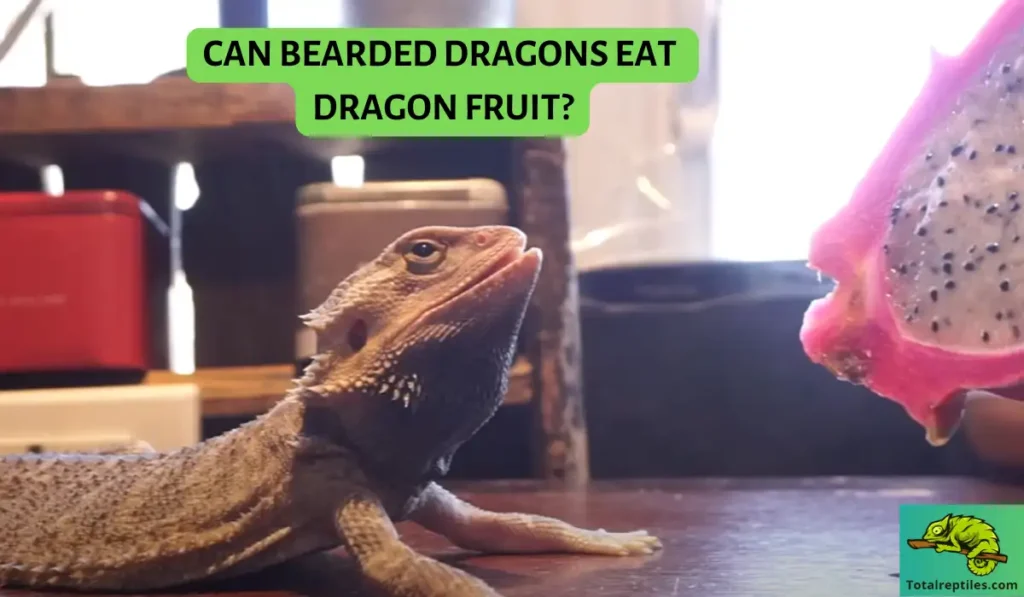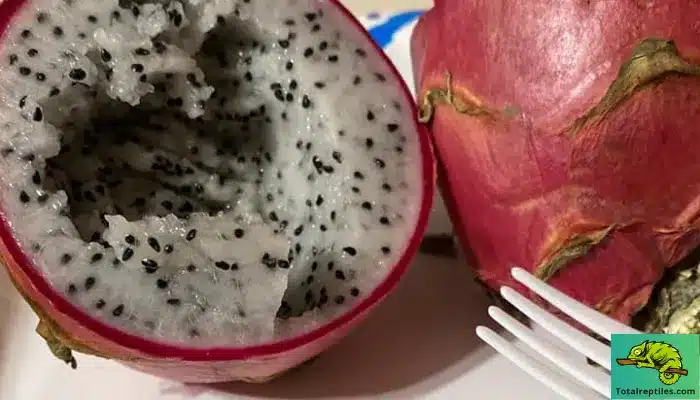Yep, bearded dragons can eat dragon fruit! This tropical fruit with a cool name is safe for beardies to eat in moderation. Dragon fruit is known for its unique pink, yellow, or red flesh and black edible seeds. With its sweet, mild taste and fun-to-eat texture, many beardies will readily gobble bites of this fruit.
But can they eat too much? Dragon fruit does offer some nutritional benefits for bearded dragons. The tropical fruit contains vitamins, minerals, and antioxidants that support lizard health.
This article will explain everything you need to know about feeding dragon fruit to your favorite reptile.

Nutritional Profile of Dragon Fruit
Regarding bearded dragon nutrition, it’s important to understand exactly what’s in the foods we feed them. Here is a table with nutritional values for dragon fruit based on information from the USDA Food Data Central
| Nutrient | Amount per 100g |
| water | 83.96 g |
| Energy | 57 kcal |
| Protein | .36 g |
| Carbohydrates | 15.23 g |
| Dietary Fiber | 3.1 g |
| Sugars | 9.75 g |
| Fat | 0.14 g |
| Calcium | 9 mg |
| Phosphorus | 12 mg |
| Potassium | 116 mg |
| Vitamin C | 9 mg |
Macronutrients
start with macronutrients—carbs, proteins, lipids, and water.
- Carbs: Dragon fruit contains about 9 grams of carbs per 100g serving, mostly natural sugars. The sugar content is something to watch out for, but the carbs also provide a quick energy source for bearded dragons.
- Protein: There’s not a ton of protein in dragon fruit – just 1-2 grams per serving. But every little bit counts towards Beardie’s daily protein needs.
- Fat: Practically zero fat here makes a lean, low-calorie food option.
- Water: With about 85% water content, it can help keep your beardie hydrated.
So, regarding macronutrients, this tropical fruit makes a decent treat thanks to its natural carb and water content.
Micronutrients
Each serving contains these vitamins and minerals:
- Vitamin C: Supports a healthy immune system and provides antioxidant activity.
- Calcium: Critical for proper bone development and function.
- Phosphorus: Works with calcium to maintain bone strength.
- Magnesium: An essential mineral involved in muscle, nerve, and enzyme activity.
- Iron: Helps transport oxygen in the blood and aids metabolism.
- Fiber: Promotes good digestion and gut health.
Nutrient Balance
Dragon fruit contains other B vitamins, antioxidants like lycopene, and omega fatty acids. The seeds are especially rich in nutrients and fiber.
There’s one potential downside regarding the calcium-phosphorus ratios in dragon fruit. Ideally, this ratio should be 1:1 to 2:1 for proper calcium absorption. But in this fruit, there tends to be almost 3-4x more phosphorus than calcium.
That’s why feeding in moderation is key – to prevent an excess of phosphorus from inhibiting calcium absorption over time. As an occasional treat, though, it can provide a healthful nutrition boost.
So, by keeping dragon fruit intake occasional and limited, bearded dragon owners can let their pets enjoy these refreshing, tropical fruits.
Varieties of Dragon Fruit
When you head to the store or market looking for dragon fruit, you’ll likely come across several varieties. While all types can be fed to bearded dragons in moderation, it helps to know the differences to pick the best ones.
There are three main kinds:
- Red dragon fruit – This variety has bright magenta red skin and flesh. The taste is sweet with hints of berries. The red pigment comes from lycopene, a potent antioxidant.
- White dragon fruit – With yellowish-white skin and flesh, white fruit is mildly sweet with a crisp, juicy texture. It tends to be less seedy than the red variety.
- Yellow dragon fruit – As the name suggests, this type has vibrant yellow skin and flesh. It’s naturally sweeter than white fruit with a tropical mango-pear flavor.
While all the types provide benefits like vitamins and minerals, the red and yellow varieties contain higher levels of antioxidants like lycopene and flavonoids.
Health Benefits of Dragon Fruit for Bearded Dragons
let’s explore some of the health benefits this tropical fruit can provide:

Vitamins
Dragon fruit is packed with Vitamin C – a single serving provides about 30% of a bearded dragon’s recommended daily Vitamin C intake. This vitamin’s immune system, wound healing, and antioxidant properties are crucial. Antioxidants fight free radicals that harm cells and cause disease.
Minerals
Calcium and phosphorus are two minerals that are especially beneficial for beardie. Both are crucial for bone health, growth, and strength.
This fruit also provides magnesium, a mineral involved in over 300 enzyme reactions in the body. Other minerals found in smaller amounts include iron, potassium, and zinc.
Fiber
With around 2-3 grams of fiber per serving, dragon fruit can support healthy digestion in bearded dragons. Fiber adds bulk to stool and helps food pass smoothly through the digestive tract. This helps prevent issues like constipation.
Hydration
The high water content in dragon fruit (about 60% by weight) helps keep bearded dragons hydrated. Proper hydration supports all bodily functions and prevents problems like kidney disorders.
Other Benefits
Feeding small, occasional portions can provide a nutritious boost alongside your beardie’s staple greens, veggies, proteins, and supplements.
Risks and Concerns with Too Much Dragon Fruit
While dragon fruit can provide valuable nutrition for bearded dragons in moderation, there are some potential downsides if too much is fed. Here are a few key risks and concerns associated with overdoing it.
High Sugar Content
Like all fruits, dragon fruit contains natural sugar. The 9 grams of sugar in a 100-gram meal are mostly fructose and glucose. That has about as much sugar as two plums or one mango.
Too much sugar can lead to obesity, cardiovascular disease, and diabetes in bearded dragons like humans. It may also cause digestive upset, like diarrhea, when excess fructose ferments in the gut.
Improper Calcium-to-Phosphorus Ratio
One of the biggest concerns is that it contains significantly more phosphorus than calcium. The ideal ratio of nutrition is 1:1 to 2:1 calcium to phosphorus. But dragon fruit may have 3-4 times more phosphorus.
When excess phosphorus is fed, it can bind to calcium in the gut and prevent proper calcium absorption.
High Fatty Acid Content
The edible black seeds in dragon fruit provide beneficial compounds like omega fatty acids. Too many fatty acids from overfeeding the seeds can irritate the stomach lining and potentially cause diarrhea or loose stool. Occasional seeds are fine.
When used sparingly in a balanced diet, this tropical fruit can be a fun, healthy supplement for bearded dragons.
How Much and How Often to Feed Dragon Fruit
By now, it should be clear that moderation is key when feeding bearded dragons. But how much and how often is ideal for reaping the benefits while avoiding the risks?
Recommended Frequency
Dragon fruit should be an occasional treat rather than a regular part of your beardie’s diet. One or two feedings a month is a good rule. Healthy greens, vegetables, meats, and vitamins should be their mainstays.
Suggested Serving Size
The right portion size depends on the dragon’s age and size. Here are some general recommendations:
- Adult bearded dragon: 1-2 inches cubed (a small handful)
- Juvenile: 1-inch cubed
- Baby dragon: 1/2 inch cubed
Watch for Signs of Overfeeding
Watch for symptoms like diarrhea, loose stool, decreased appetite, weight gain, lethargy, or other abnormalities that may signal you’re feeding too much dragon fruit.
Keeping servings infrequent, small portions, and watching closely for overfeeding signs are the keys to successfully incorporating into a bearded dragon’s diet!
Preparing and Serving Dragon Fruit Safely
Proper preparation and serving practices are key to getting the most out of nutritional benefits while avoiding risks. Here are some tips for serving dragon fruit safely to bearded dragon:
Selecting Fresh, High-Quality Fruit
Always inspect thoroughly before purchasing. Look for vibrant, unbruised fruit free of mold or mushy spots.
Washing Well
Wash fruit under cool water before preparing, even if organic. Thorough washing helps remove potentially harmful chemicals.
Peeling or Cutting
You can peel off the entire outer skin or cut the fruit in half lengthwise, then scoop out the flesh and seeds.
Chopping Up
chop the prepared fruit into small, bite-sized pieces appropriate for your bearded dragon’s size. Chopping makes it less likely they will choke and easier to digest.
Portioning Properly
Refer to portion recommendations based on the dragon’s age to prevent overfeeding. Only leave the suggested serving amount in their habitat at one time.
With sound preparation procedures and appropriate portion sizes, owners can confidently offer dragon fruit as an occasional treat. Proper serving methods coupled with moderation help minimize any risks of overfeeding.
Can bearded dragons eat starfruit?
Unfortunately, starfruit is not recommended for bearded dragons. While this tropical fruit may seem like a fun, tasty treat, it contains compounds that can be toxic and harmful to reptiles.
Specifically, starfruit has high levels of oxalic acid. Oxalates produce hypocalcemia, a significant calcium deficit, by binding to calcium. Starfruit oxalates can also lead to kidney damage over time.
Beyond oxalates, starfruit poses other risks like intestinal blockages, thiamine deficiency, and issues from natural sugars.
Conclusion
when fed properly, dragon fruit can be a nutritious and safe occasional treat for bearded dragons—the vitamins, minerals, fiber, and hydration of dragon fruit offer great health benefits.
However, with the high natural sugar content, disproportionate phosphorus levels, and fatty acid content in the seeds, it’s best used in moderation. Limit portion sizes to a dice-sized amount once or twice per month.
Always monitor your bearded dragon for signs of digestive upset or overfeeding if providing dragon fruit. And be extra cautious with juvenile dragons more sensitive to nutrient imbalances.

